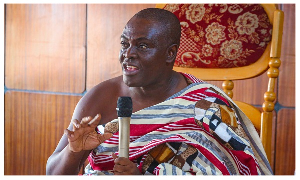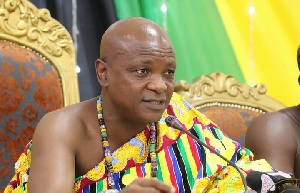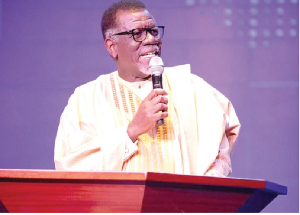Opinions of Thursday, 23 December 2010
Columnist: Sakyi, Kwesi Atta
Commentary On The 2011 Ghana Budget Statement
Commentary On The 2011 Ghana Budget Statement MADE BY DR KWABENA DUFFOUR TO PARLIAMENT ON 18TH NOVEMBER 2010
INTRODUCTION
A budget is a fiscal instrument which is used by the government as a policy instrument to achieve broad macroeconomic objectives such as:-
a) Achieving accelerated economic growth
b) Stabilizing inflation or money growth
c) Achieving domestic equilibrium in expenditure and income
d) Achieving external equilibrium in the balance of payments
e) Providing a backdrop/backcloth to woo foreign direct investment (FDI)
Every year end, the Minister of Finance and Economic Planning outlines in the budget how government intends to raise revenue to meet the expected or estimated expenditures to be made in the ensuing year. If a budget deficit is envisaged, then it means expected revenue is less than expected expenditure (G?T). If on the other hand a budget surplus is planned for, then it means government expenditure (G) is less than revenue (T) and there is savings. The latter is contractionary and it can be afforded in an advanced country or oil rich country where inflationary and unemployment pressures are minimal. A balanced budget is one where planned expenditure (G) equals planned income (T). The budget has two components, namely recurrent expenditure and capital expenditure. Recurrent expenditure is the money set aside for wages, salaries, and emoluments and for running and maintenance of already existing government institutions and paraphernalia. On the other hand, capital expenditure outlines expenditure on new capital and social infrastructure such as construction of new roads, schools, hospitals and public utilities.
SOURCES OF GOVERNMENT REVENUE
Government has many sources of revenue which in the main consist of direct taxes on individual and corporate incomes, capital gains tax (lottery wins), inheritance tax, among others. In most poor developing countries such as Ghana, it is very easy to target individual and corporate incomes since these are easy to collect and they cannot be passed on. Since this is a visible tax and it is directly felt by workers and companies, it is likely to have a lot of protests and resistance to upward increment of direct taxes. According to the Laffer Curve theory, there is likely to be more tax evasion and tax avoidance should direct tax become unbearable and subsequently it will lead to a dip in government revenue. Adam Smith in his book, the Wealth of Nations in 1776, gave the principles and canons of a good tax system as one which is economical to collect, equitable in its administration and incidence, transparent and certain as to who to pay tax, when, where, how and why. The tax system should also be convenient to the taxpayers. In modern times, we shall add that a good tax system should be flexible with in-built automatic stabilizers or fiscal drag so that COLA (Cost of Living Adjustments) to the effects of inflation can automatically be reflected in the pay cheques or slips of workers. This system works in an advanced country such as the UK where the database is up to date. According to the Lorenz Curve and Gini Ratio, progressive tax and subsidies, plus tax exemptions are some of the identified methods to close the wide income gap between the rich and poor in society. Without closing this poverty gap, the wealth transmission mechanism via the Keynesian multiplier cannot work properly.
Other sources of government revenue include indirect taxes on goods and services such as excise duties, customs duties and tariffs, expenditure taxes, surcharges, VAT (Value Added Tax), among others. If indirect taxes are raised, they tend to affect everybody because this tax is difficult to evade. Mostly these taxes are targeted to discourage the consumption of demerit goods such as cigarettes, alcohol, luxuries and Veblen or ostentatious goods or conspicuous consumption. Indirect taxes tend to penalize those who have formed the habit of consuming demerit goods and sometimes the indirect tax regime is aimed to be soft or low on merit goods such as educational materials and essential medication. Some of these merit goods as well as public goods may be subsidized to encourage their consumption. Thus, tax is a policy tool in allocating resources and deciding the basic economic issues of what to produce, how to produce, where, where, who to produce for. Indirect taxes, however, may be inflationary in their effects.
Government sources of revenue also include fines, licences, grants, gifts, property tax, toll gate collections, and poll or head tax, domestic and foreign loans. Government can raise domestic loans by selling treasury bills and bonds. Foreign loans can be acquired through bilateral and multilateral channels such as from former colonial masters, our leading trading and cooperating partners and multilateral institutions such as the IMF, IBRD, EU. ADB, SIDA,DFID, CIDA, USAID, NORAD, DANNIDA, JICA among others. Some of these external loans come with heavy conditionalities or heavy strings attached to them. These are called tied loans. Some of them are fungible as they lead to long term heavy indebtedness and enslavement. However, after the Second World War, under the Marshall Plan, Japan and South Korea received massive aid from the USA. So also did Taiwan. Japan in turn heavily invested in the Asian Tigers including Thailand, Indonesia, Malaysia and China. Therefore, it is unwise to draw a blanket conclusion that foreign loans are bad. It all depends on the hard work and culture of the people receiving the loan and the transparent manner in which loan projections are implemented and monitored.
AREAS OF GOVERNMENT EXPENDITURE
In the year 2000, the UN set up the target of 2015 for achieving the eight Millennium Development Goals (MDGS). This has posed a huge challenge to governments in the poor developing countries to devote a greater chunk of their budgets to the social sector in eradicating poverty, reducing infantile and maternal mortality rates, increasing literacy rates, eradicating or minimizing diseases such as malaria, polio, HIV/AIDS, TB, among others. In Ghana, a lot of progress has been made in achieving high literacy rates through the School Feeding Programme and the Free Education System up to Junior Secondary School. Also a lot has been achieved in bridging the income gap between the rich and poor through the Single Spine Salary Scale in the public sector. Government has also improved the lot of farmers by giving them substantial increases in the producer price of cocoa. Besides, government spends a lot on farm subsidies and agricultural extension services.
Currently, the government of the NDC led by His Excellency Professor John Atta Mills is spending a lot of public revenue in the construction of roads, railway lines, bridges, hospitals, schools, universities and power generation stations such as the Bui Dam and Aboadze Thermal Station. One area that the government needs to spend more money on is market research and scientific research. Many Ghanaian geniuses have come up with wonderful inventions and ideas but they cannot commercialise them. Many farmers produce a lot of farm produce which cannot find markets. Government needs to pump more money in researching into crops, diseases, alternative sources of energy and also on the tourism potential of our landscape and rich cultural heritage. Government needs to encourage book writers and publishers so that Ghanaians can get more educated and exposed. The book industry is a money spinner and it can create lots of jobs.
It is important for government to discharge its domestic and foreign debt obligations for it to earn sovereign rating from Standard & Poor and for businesses and foreigners to have confidence in our economy. Currently, the government is working tirelessly to settle most of these debts, some of which are deadweight loss because their contraction led to welfare loss and unrequited exports.
The area of government expenditure is vast and I think it is better to adopt the new accounting procedure of activity based budgeting or zero-based budgeting rather than the moribund historical or item-based budgeting. In this way, the budget will become dynamic and flexible and not an annual ritual of incremental budgeting. If the government can spend about 80% of budget revenue on recurrent expenditure, then there will be potential outward expansion of the production possibility frontier. Unfortunately, in the 2011 budget, capital expenditure is only 12%. Countries like Japan, China and Singapore have made tremendous economic strides because of their culture of thrift and frugality. However, there is a French proverb that states that you cannot eat omelettes unless you break eggs. The budget expectation of the Ghanaian is high and government is looked upon as having a magic wand for achieving the Better Ghana Agenda in a matter of days or months. There are many claimants and stakeholders in the economy to satisfy. I think what the Ghanaian government is currently doing is the right thing as it has a roll-over budget with a short-term development plan of 3 years which dovetails into the longer term plan of 2030 when Ghana is expected to achieve middle income status. Currently, we need to invest heavily in human capital by improving the quality of education and health. The 2011 budget is helping to do that as the budget aims to build two new public universities in Ho and Sunyani, besides hundreds of basic and junior secondary schools to be built. At this juncture, I need to make an observation that our medical services are still not up to scratch because of poor attitude of nurses to patients, lack of drugs and equipment in hospitals, excessive bureaucracy, improper sanitation, among many other challenges. I suggest that the government should establish mobile clinics to penetrate the rural areas to take health administration to the people. Government should also spend more on oral health, dental care and eye-related diseases. Ghana needs big turnkey projects that will kickstart the economy and act as a leading sector to influence all other sectors. I think this lies in either petrochemicals or in a huge car assembly plant. The government should explore the possibility of partnering with say Japan or South Korea in this area. Already the STX Housing deal is on but will it be a turnkey project? We have seen an explosion of construction of buildings in Ghana yet it has not rubbed on very well on the economy. What we need is a take-off or breakthrough to industrialization, using the ideas of W.W. Rostow’s five stages of economic growth. Also to be considered are the ideas of Rosenstein Rodan, Gunnar Myrdal, Michael Todaro and Hirschman, among others. I think we need the equivalent of an Abuja or new capital in Ghana to provide the fillip or take-off. Government should seriously plan to build a new capital in a central place such as Atebubu in the Ashanti Region or Brong Ahafo Region.
Findings and Analysis of the 2011 Budget statement of Ghana
_____________________________________________________________________________
PREVIEW OF 2010 ECONOMIC PERFORMANCE
In 2009, GDP grew 4.1% against the backdrop of 2% for Sub-Saharan Africa. The budget deficit was reduced from 14.5% to 9.2% of GDP in 2009. Inflation reduced in 16 consecutive months from 20.74% to 9.38% in October 2010. Foreign reserves as at October 2010 stood at $3.973 billion dollars, providing 3.2 months’ import cover. This is a significant achievement for the country and it portends prudent fiscal management. Having single digit inflation is also a significant achievement. However, while in the USA the Federal Reserve Bank targets interest rate, in Ghana and other low-powered money economies, there is inflation targeting. The low level inflation rate translates into the Ghana Cedi having more purchasing power and also its appreciation against other foreign currencies. It also means we pay less when servicing our external debts. It is hoped that with oil exploitation as collateral in foreign business transactions, the Cedi’s clout will increase and it will now be quoted on the major stock exchanges around the world. The period 2010 to 2013 has been designated as a period of accelerated growth in the social-economic sectors as well as in the stocking up of physical infrastructure. I believe this is the basis for take-off of the Ghanaian economy for sustainable growth. The theme of the 2011 budget is: Stimulating Growth for Development and Job Creation. The sectors which have been targeted are Energy, Road and Rail infrastucture and social interventions in Health and Education. It is noteworthy that Energy has been given priority because if huge industries are to be sited in Ghana, they will need a lot of power supply. I remember in the late 70s during the time of Lt Gen Kutu Acheampong, the Japanese came to negotiate to exploit the bauxite at Nyenahin, near Kibi but in the process, Kaiser Aluminium at Tema denied them the requisite power input for their operations and the project fizzled out. If we need heavy investment in industries, it will require a high output of power. I suggest we explore tapping the hydro-electric potential of Rivers Tano, Pra and Ankobra. Besides, we can also consider alternate safe sources such as tidal power, geothermal power, wind energy and bio-fuels. The government can contact countries such as Israel, The Netherlands, Brazil, Spain and Turkey which have made inroads in these fields. It is also right that the government is going to invest heavily in road and rail infrastructure. In geography, it is believed that the degree of development and sophistication of a country can be evinced from its nodal connectivity, using Kansky’s measurement. Ghana needs decongested speedways and autobahns to transport raw materials and machinery to production sites and to convey finished goods to the markets. Our railway network is too basic and too linear. Let us hope the system will be extended to the north, west, and eastern parts of the country to tap all our resources. In terms of rail development, we can fall on the expertise of the Canadians, Swiss, Japanese, Germans and Americans. China and India can also be considered, though I am skeptical of their technology in such heavy industry.
The period 2007- 2009 saw the global economic recession. It started in the USA, in the housing and banking sectors. Currently, the PIGS countries in Europe are still reeling and not out of the woods yet. Massive EU bailouts have been given to Greece and Ireland. Portugal and Spain are yet to be bailed out. This has swamped demand and caused donor aid to be massively cut. This means poor countries such as Ghana have to be self reliant. I suggest that Ghana should increase its food production so as to cut down on imports of rice, meat, fish and flour which we can grow easily in Ghana. Of course, Ricardo and Adam Smith suggested that comparative and absolute cost advantages should be considered in our external trade transactions. Evidence in the former communist economies suggests that the closed economy multiplier has a bigger bang or multiplier effect than the open-economy multiplier. In this vein, we can for a certain period, reduce massively on imports of rice and meat/fish products so as to create internal capacities for growing our economy. This is what China did to be where it is today. Even Japan adopted an external export-oriented growth approach and used massive bureaucracy to block foreign imports. America turned a blind eye then because of the Cold War and its attempt to have close allies and to stop the spread of communism. Ghana has to tread cautiously in its attempt at free and unfettered trade in the ECOWAS region as well as its adoption of a common currency. I hope the euphoria has been dampened by what is happening in the Euro zone and there should be circumspection in opening wide our borders. Proper modalities have to be put in place, especially in terms of property rights, citizenship, national registration and right of residence. It is a pity that the 2011 budget does not give enough breakdown of defence and security expenditures. In July 2009, the IMF provided Ghana an SDR (special drawing right) amounting to 602 million dollars as balance of payment support, despite Ghana enjoying favorable cocoa and gold prices on the world market. The current imbroglio in Ivory Coast is saddening yet it could be a blessing in disguise to Ghana in terms of cocoa prices.
The 2011 budget projects a GDP growth rate of 12.3%, ostensibly a record growth rate exceeding that of China. Perhaps, this would be put down to oil exploitation which came on stream on 15th December 2010. Cocoa output is projected to reach 650,000 metric tonnes by the end of 2010. This record has been achieved due to the good policies of the present and previous governments to raise the producer price of cocoa to 75% of free on board (FOB) price. This is more than unbelievable and a realistic poverty intervention strategy. Incentives to cocoa farmers range from subsidies such as pest control insecticides, good feeder roads and farmer education. The target budget deficit is put at 7.5% of GDP. This makes it an expansionary budget. Let us hope it will impact positively on employment creation but not negatively on inflation. Revenues are projected to be below by 1.8% and expenditures to be up by 8%. The fiscal deficit is 8.8% of GDP as against the target of 7.6%. This has been explained as caused by government attempt to clear domestic arrears to suppliers and also an increase in project loans. I think our budget administration lacks proper oversight, hence the budget variances. I think the Ministry of Finance needs to establish project monitoring and inspection units to ensure that project implementation does not suffer overruns and project creep. The onus also lies on project clients to be proactive in ensuring that project managers execute projects within the timeframes and that the project milestones are met timeously. The domestic deficit has been reduced from 3.2% to 2.1% and by year end, a target of 1.4% has been set. This is commendable and good news to suppliers. Food inflation has declined from 15.8% in 2009 to 5.6% in October 2010, while non -food inflation declined from 21.8% to 11.8%. The Cedi therefore appreciated. By July 2010, the Bank of Ghana minimum lending rate or bank rate stood at 13.5%, very commendable for a developing country. However, commercial bank lending rate is still high because the banks contend that there is a very high risk of lending to small scale enterprises. This may not be the case. The real reason is that most of these non-indigenous banks are making unheard of profits all over Africa and they are not prepared to operate on a country-by-country case study basis. These foreign-based banks take instructions from outside, to the extent that even a small local decision is taken at their headquarters outside Ghana. BOG has to intervene to reduce the cost of borrowing by asking first the indigenous banks to bite the bullet. Up to September 2010, the Balance of Payment stood at 100 million dollars.
EDUCATION AND HEALTH
In 2010, 175 classroom blocks were completed and contracts for additional 165 new schools were awarded. Also 214 six-unit classroom blocks were built for senior secondary schools. The Capitation Grant to schools stood at 23.8 million Ghana Cedis and the School Feeding Programme gobbled 50 million Ghana Cedis.
In the health sector, a 100 bed hospital was completed at Teshie among many others throughout the country. The Bolgatanga Hospital was upgraded and completed. 5 midwifery training colleges were established and many nutrition intervention programmes were carried out.
AGRICULTURE
A National Food Buffer Stock Company (NAFCO) has been set up to manage food security and it purchased 6049 metric tonnes of rice and 416 metric tonnes of maize. 60,000 metric tonnes of fertilizer subsidies were given out, 35000 Cockerels were given to 1750 farmers and 2584 hybrid livestock supplied. 6 Fish Cold Stores were set up countrywide and 11.1 hectares Fish Ponds and 192 Fish Cages established. The Alliance for Green Revolution in Africa (AGRA) gave out 2 million dollars credit to farmers, apart from the 4 million Ghana Cedis credit extended to farmers. The producer price of Cocoa was raised to 3200 Ghana Cedis per tonne. Farmers were paid 650 million Ghana Cedis bonuses. It is heartening to note that the government is doing a lot to revamp agriculture and I think we need to rejuvenate commercial or large scale farming to provide food and raw materials to industries. Sir Arthur Lewis in his growth theory emphasized the need to release the surplus labour in agriculture for other uses. This can be met by going for capital-intensive large scale farming – perhaps our farmers can form cooperatives and consolidate land-holdings towards this end. Also the land tenure system has to be reformed to ease commercial farming. Maybe government can launch a programme to attract some big time farmers from outside to come and invest in plantations for cocoa, bananas, pineapples and citrus fruits. Plans should be made to have integrated agro-processing factories.
TRANSPORT
In the area of transportation, the current government is building on the laudable efforts of its predecessors. We need continuity in our development programmes. In 2010, 3975 kilometres of road was routinely maintained and there was regravelling of 444 kilometres of roads. 700 kilometres of urban roads were attended to and 8 bridges were constructed. The Accra-Tema rail line was re-opened. Two floating docks at Akosombo were put into service for roll-on-roll-off (RoRo). 75 kilometres of trunk roads were macadamized and 348 kilometres of feeder roads paved to food producing areas. The 14 kilometre N1 Malam Junction-Achimota road is ongoing.
ENERGY AND WATER SUPPLY
The Bui HEP dam is 32% complete and it will generate 400 megawatts of power while the Aboadze Thermal Station will generate 132 megawatts. Circuit breakers are being installed in Kumasi, Winneba and Techiman and are 80% complete. Water purification plants are being constructed at Nyanyano, Senya and Kasoa.
EXPORTS
To facilitate trade with neighboring countries, 320 French officers are being trained. The Ghana Export Promotion Council is aggressively marketing Ghana abroad. Ghana has yet to expose her quality goods to the outside world, especially non-traditional exports such as crafts, food items and tourism. Even our educational facilities and quality senior secondary schools need to be marketed abroad to bring in foreign exchange and to engender competition in our schools. It has been observed that there are many challenges facing budget implementation in Ghana. Notable among them is the increasing wage bill, lack of budget discipline and the huge domestic debt. It is to be hoped that with the start of oil exploitation, there will be leeway to reduce the burden of the wage bill which amounts to 12% of GDP, with 75% of all wages consumed by the education, health and local government sectors. The solution to this is to decentralize a lot of the cost through cost- sharing arrangements, return of some schools to the missionaries, adoption and embracing Public-Private Partnerships (PPP) and Build, Operate and Transfer (BOT) concepts. Our Constitution needs further revisiting to offload some Central Government functions to the District Assemblies. In this devolutionary and power sharing arrangement, it is hoped it will not lead to atomization, fragmentation or sactterisation of Central government authority but rather it will strengthen economic growth and development, engender development from the grassroots (bottom-up) development and reduce big government. If we apply the principle of subsidiary, it will lead to efficiency, effectiveness and economy (3E’s). America (USA) is a great country because of applying the maxim of unity in diversity. The federal constitution enacted in 1776 has not dichotomized the USA. On the contrary, it has made America great by drawing on its diverse talents and creating political space for native ingenuity. Gone are the days when everybody expected largesse from government. Now, in this era of globalization, we need to think outside the box. I will venture and recommend strongly to the Executive and Legislature to give close scrutiny to the governance systems in place in countries such as Switzerland and Germany. The cantons and counties are empowered and made self-sustaining units with federal grants supplementing their revenue. Even in a unitary state such as the UK, there is regional autonomy for Wales, Scotland, England and Northern Ireland. To me, there is too much wastage in the current revenue allocation system whereby the local governments are starved of funds because of revenue capture at the central government level. Students of public administration, political science, and economics, and to some extent, geography will agree with me on this thesis. I have studied all these disciplines to the highest level and taught them. Besides, I have a lot of insight into business administration and management. In management, the trend in organizational structure is delayering, flat and divisionalised structures and sometimes adopting Charles Handy’s shamrock (unglued) or clover-leaf structure. Anthony and Henry Mintzberg give us variants of organizational structures. In political science, I have followed arguments put forward by gurus such as Harold Laski, Harold Laswell, Lord Acton and Karl Deutsch. It is instructional to read older texts on governance by people like Montesquieu, Thomas Paine, Michaevelli, Hans Morgenthau and Woodrow Wilson. For management ideas, it will be insightful to read Koontz & O’Donnell, Fred Luthans, Laurie Mullins, Robert Appleby, Johnson & Scholes and Stephen Robbins.
2011 BUDGET AND FISCAL HIGHLIGHTS
The 2011 Budget is the most innovative budget that I have ever come across in my 40 years of teaching and to me it is possible to win a global award as the budget of the year. The budget seeks to come up with ingenious ways of increasing the revenue base and extending the tax net as well as seeking revolutionary approaches to seal up the revenue leakages in the system. Leakages include items such as savings, taxes and imports (STM) and injections are made up of investment, government expenditure, and exports (IGX). For example, to increase tax compliance and reduce incidences of tax evasion and tax avoidance, mining companies are being asked to pay their royalties monthly instead of quarterly. I hope this will not increase their shoestring, menu and transactions costs. Also the deferred payment of VAT has been discontinued to reign in all the monies due, to avoid delays in the implementation of projects. Withholding tax has been increased from 50 cedis to 500 cedis. The tax holiday which was given to hotels has been discontinued to avoid loopholes being abused. Capital gains tax has been upped from 5% to 15%. So also has Gifts Tax. In this way, a tax dragnet has been tightly laid to trawl in all those who hitherto escaped the tax net. VAT threshold has been increased from 10,000 Ghana Cedis to 90,000 Ghana Cedis. This, I am sure, is a poverty reduction palliative or relief. There is an innovative 20% environment tax which will cheer those of the Green Party and global warming campaigners. Ad valorem tax has been reduced by 2.5%. This is a welcome relief to the well-off who enjoy buying luxuries. However, excise duty on cigarettes has been increased from 140% to 150%, perhaps as a deterrent to stop smoking. Vehicle tax has also been upped, perhaps to discourage private cars and to encourage the use of mass transit commercial buses and coaches. Professionals like lawyers, accountants and doctors are going to pay more tax. It is hoped they will not pass this on to their clients.
Income tax bands
G1140 – Zero tax
Next 360 – 5% tax
Next 840 – 10% tax
Next 17976 – 17.5% tax
Income exceeding 20,280 – 25% tax
This progressivity of income tax is much welcomed as it will bridge the income gap and it is moderate, compared to some countries where the upper limit goes up to 40%. In this way, tax is not a disincentive to work. Furthermore, tax relief has been granted to workers in respect of dependants, education and training and old age. It is hoped there will be no abuse of this tax relief as in some cases some workers file fake papers to earn tax rebate. This is also a plus for poverty alleviation and it will lead to job satisfaction. It is hoped it will not be counter productive to lead to a baby boom and fake arranged marriages. What is important is to have in place an effective tax redistribution system that will transfer tax earnings to the poor and vulnerable in the society. Airport tax has been increased in all categories by 33%. Energy saving lamps enjoy tax exemption and a debt recovery levy has been slapped on oil imports. It is exceptionally cheerful to learn that parliamentary permits and tax waivers have been removed. This should be an eye-opener to other countries. It also shows that the government is a listening and empathetic government. It is extremely important to announce that NGOs will have their permits reviewed for tax assessment. I think all the churches should be heavily taxed so that they contribute to the national kitty because they use national resources. It is also a wise move to discontinue vehicle tax exemptions which were granted to teaching and health personal. These are in large numbers and it would have been a huge fiscal drain. It is to be commended that the budget planners have seen the need to increase property tax in order to make the local governments more viable and also to make landlords more responsible. It will bring some order in the unplanned property boom and provide a shot in the arm to the hitherto withering local governments.
Oil revenue is expected to be just 1.9% of GDP. Domestic revenue to 21.5%. Tax revenue constitutes 24.8% and grants from donors, 4.2%. Non-tax revenue makes up 26.4%. The total expenditure for 2011 is GC12, 670.8 million which is 40.7% of GDP. Recurrent expenditure is GC8, 924.9 million which is 28.6% of GDP or 70.4% of total expenditure. The remaining 12% is for capital expenditure. Personal emoluments will gobble up GC3, 732.8 million, 12% of GDP or 30% of the budget. Let us hope this will have multiplier effects on the economy. Ghanaians need to be educated to embrace a saving culture by reducing their marginal propensity to consume and thereby increasing their marginal propensity to save. Savings create loanable funds for investment and for long term sustained economic growth. There is in fact a positive correlation between savings and real GDP. However, there is the downside of the paradox of thrift but this may not apply to Ghana, a developing country. Interest payments will gobble up GC1831.3 million or 14.5% of total expenditure or 5.9% of GDP. An amount of GC 459.1 million will be spent on servicing foreign debts and GC1, 372.2 million on domestic debts. A sum of GC262.2 has been allocated to GNPC for its investment activities. There is a budget deficit of GC 2.3 million or 7.5% of GDP or 18% of total expenditure with almost half of it sourced externally and the other half internally. This means government domestic borrowing will be GC1200 million or 9% of the total expenditure. It is hoped this will not lead to crowding out effect on the private sector and lead to pushing up both interest rates and inflation.
All in all, this is a robust budget of growth which hopefully will lay a solid foundation for the future goal of achieving middle income country status. In 1966 there was an international educational conference in Addis Ababa which recommended that countries should devote a minimum of 4% of GDP to education. On a happy note, the 2011 budget has devoted 7% of GDP to the education sector. In 1978 when I wrote my undergraduate thesis in Economics at Legon, I wrote on the topic: Investment in human capital as a factor for economic growth and development – the case of Ghana from 1957 to 1974.
I made very interesting findings in my time series and cross country analysis as I concluded that significantly, investment in health and education do impact on growth of real GDP. My work was buttressed by earlier findings made by economists such as Psarchalopoulus and Hinchcliffe. I vividly remember these facts which I wrote 32 years ago. The current budget, if religiously implemented, will prove me right.
CONCLUSION
Let us hope that the 2011 budget, with its heavy investment in physical infrastructure and human capital, will produce the Keynesian multiplier and accelerator effects which should reinforce each other to catapult the Ghanaian economy out of its current sojourn on the trade cycle to reach a climactic climax or a boom. It is also expected that the economy will be released from its Leibeinstein’s low equilibrium trap and cause a Todaro core- peripheral effect or a Myrdal cumulative concentration ripple effect of growth. We also expect the exploitation of oil in the western extremity of the country to cause a growth pole effect on the economy. Not least expected is a Harod-Dormar investment-capital effect or a Cobb-Douglas production function effect where deepening the capital-output ratio leads to tremendous outward expansion of the production possibility curve or frontier. As it is, it may be surmised that if Ghanaians bite the bullet, the forecast 12.3% economic growth rate may either be attained or exceeded, baring no unforeseen untoward external supply shocks. The real impact of the 2011 budget will be felt a couple of years from its inception as there is a lagged effect. With a roll-on budgetary system in place, it is some years from now that the whole impact of this Kondratief cycle can be realized. Surely, Ghana has embarked now on a long growth cycle of about 70 year’s wavelength. We would henceforth need the meticulous planning ingenuity of economists such as Solow, Simon Kuznets, Abrahamovitch and others which involve complex input-output matrices and mathematical equations. Suffice to say that I doff off my hat to the Finance Minister, Dr Kwabena Duffour, and his team at the Ministry of Finance and Economic Planning in Accra.
By Kwesi Atta Sakyi, B.A (Hons) Legon, MPA (summa cum laude) UNISA.
Mr Kwesi Sakyi is an Economics and Business Management teacher at the International School of Lusaka in Zambia. His email address is: attakas2003@yahoo.com












